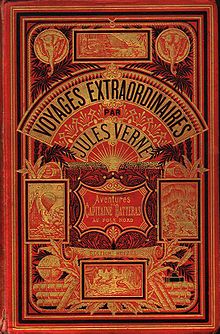Voyages extraordinaires

A typical in-8º Hetzel cover for the Voyages Extraordinaires. The novel is Les Aventures du Capitaine Hatteras au Pôle Nord, and the cover style is "Aux deux éléphants" ("With two elephants").
|
|
| Author | Jules Verne |
|---|---|
| Country | France |
| Language | French |
| Publisher | Pierre-Jules Hetzel |
| Published | 1863–1905 (additional novels revised or written by Michel Verne added 1905–1919) |
| Media type | print (hardcover and paperback) |
The Voyages extraordinaires (literally Extraordinary Voyages or Extraordinary Journeys) is a sequence of fifty-four novels by the French writer Jules Verne, originally published between 1863 and 1905.
According to Verne's editor Pierre-Jules Hetzel, the goal of the Voyages was "to outline all the geographical, geological, physical, and astronomical knowledge amassed by modern science and to recount, in an entertaining and picturesque format ... the history of the universe."
Verne's meticulous attention to detail and scientific trivia, coupled with his sense of wonder and exploration, form the backbone of the Voyages. Part of the reason for the broad appeal of his work was the sense that the reader could really learn knowledge of geology, biology, astronomy, paleontology, oceanography and the exotic locations and cultures of world through the adventures of Verne's protagonists. This great wealth of information distinguished his works as "encyclopedic novels".
The first of Verne's novels to carry the title Voyages Extraordinaires was The Adventures of Captain Hatteras, which was the third of all his novels.
The works in this series included both fiction and non-fiction, some with overt science fiction elements (e.g., Journey to the Center of the Earth) or elements of scientific romance (e.g., Twenty Thousand Leagues Under the Sea).
In a late interview, Verne affirmed that Hetzel's ambitious commission had become the running literary theme of his novel sequence:
It is my intention to complete, before my working days are done, a series which shall conclude in story form my whole survey of the world’s surface and the heavens; there are still left corners of the world to which my thoughts have not yet penetrated. As you know, I have dealt with the moon, but a great deal remains to be done, and if health and strength permit me, I hope to finish the task.
...
Wikipedia
